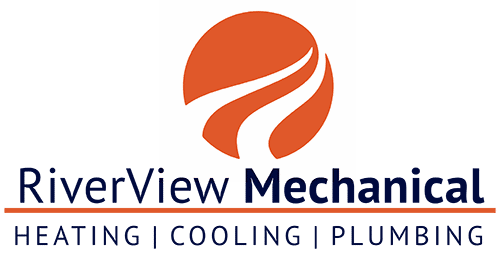FAQs
RiverView Mechanical
Have a question related to our HVAC and plumbing services? We have the answer. Check out these FAQs and give us a call today for more information!
-
Can my furnace catch fire?
While most homeowners run gas furnaces without issues for decades, the truth is that gas as a fuel source can be dangerous in some situations. And while furnace fires are rare, they’re not unheard of.
So, let’s look at the most common causes of furnace fires and how you can prevent them.
Flame Rollout
A flame rollout usually occurs in furnaces that are well past their prime or haven’t received regular maintenance and safety checks. Flame rollouts occur when flammable combustion gases build up in the combustion chamber and exit, setting fire to flammable materials that may be nearby.
Overheating
If your furnace has to work harder than it should, it can overheat, causing the temperature of the internal components to rise past their safe points, causing a fire.
Gas Pressure
Your furnace relies on safe pressure levels to operate safely. So, if the gas pressure becomes too high, it can cause the internal temperatures to increase, leading to combustion.
Heat Exchanger Failure
The furnace’s heat exchanger is a metal chamber for the hot air to blow through. The metal expands and contracts due to the high temperatures. Because of this, it’s prone to wearing out and failing if it’s not regularly inspected. If the heat exchanger is cracked or damaged, you risk carbon monoxide leaks and potential fire.
-
Why is my water heater making noise?
Does your water heater make weird popping or crackling noises? This is a common problem, but different noises point to various problems, so let’s look at the sounds your water heater may make and what they mean.
Rumbling
If you hear a rumbling sound coming from your water heater, it usually means there’s too much sediment buildup in the tank. This is a common problem for residents with hard water. The mineral deposits settle in the tank over time, and when the hot water in the tank expands, it pushes through this sediment layer, causing the rumbling noises you hear. Usually, flushing the tank solves the problem, but replacing the tank is the best solution in severe cases.
Popping
Like rumbling noises, popping is also often caused by sediment. However, in this situation, the sound occurs as steam bubbles form under the sediment layer and pop through as the water heats up.
Sizzling or Crackling
Sizzling and crackling noises are usually associated with electric water heaters and happen when the lower heating element becomes buried or encrusted with mineral deposits. As the heating element gets hot, it burns the minerals causing the noise. And noise isn’t the only issue here; because the heating element must burn through the sediment, it works harder to heat the water, causing your electric bills to rise.
Screeching
Sometimes, you might hear a screeching or whistling noise like a boiling tea kettle, and it causes many people to panic, thinking their water heater is about to explode. This sound is caused by water flowing through a restricted valve. If you hear this noise, check the pressure relief valve. This valve is designed to relieve pressure in the tank if it gets too high to prevent damage. If it’s not coming from the pressure relief valve, check the inlet valve near the water lines for leaks.
-
Why is my water pressure so low?
Trying to do routine household chores like washing dishes, showering, and cooking with low water pressure can be a real chore. Low water pressure is a common problem, especially in older homes. So, if you find yourself struggling with this, here are a few reasons it might happen.
Water Leaks
One of the most common causes of low water pressure is a water leak somewhere in your plumbing system. Some water leaks are easy to spot because of water damage or by hearing the sound of rushing water, while others require specialized tools used by a plumber.
Mineral Buildup in Pipes
Mineral buildup in pipes is common in older homes with outdated plumbing. If you live in an area with hard water, minerals like calcium build up in your pipes like cholesterol in an artery, slowly closing off the water flow. In severe cases of mineral deposits, the best way to restore water flow is by repiping your home.
Higher Water Demands
Sometimes, a family outgrows what their plumbing system can supply. If you’re running the dishwasher and the washing machine while someone is taking a shower, it will reduce the amount of water pressure throughout the house because the system can’t keep up. The best way to solve this problem is to coordinate your water usage.
Clogged Faucets & Fixtures
If you notice low water pressure at the kitchen sink or in the shower, it’s probably because that particular fixture is clogged from hard water or has worn out and needs to be replaced.
-
Why does my water heater run out of water so fast?
Sediment
Sediment buildup is the number one cause of water heater woes. Over time, dissolved minerals build up in the tank. If they’re not flushed out regularly, the layer grows so large that it reduces the amount of water the tank can hold, and you get less hot water than you’re used to.
Faulty Heating Element
Most electric water heaters have two heating elements, one at the top and one at the bottom. The lower element does the bulk of the work because the cold water enters through the bottom, so it must heat it quickly, so it’s ready for use. The top heating element is mainly for maintaining the heat. So, if the bottom heating element has failed, you will notice a significant drop in the amount of hot water your system can provide.
Age
Lastly, age eventually gets the better of all appliances, including your water heater. The life expectancy of a water heater is between 10 and 15 years; however, maintenance or the lack of, will affect how long your system lasts. Most homeowners don’t realize that every water heater has an expiration date, which you can find by looking at the unit’s serial number. Water heaters lose efficiency and power as they get older, and most experts recommend replacing them if they’re over ten years old.
-
How often do I need to change my HVAC filter?
You may not realize it, but changing your HVAC filter is one of the most important things you can do to keep your system running efficiently and extend its lifespan. However, even though it’s a simple task, many homeowners either forget to do it or take for granted that it’s not that big of a deal.
So, how often should you change the filter to maximize system performance? Well, it depends.
Experts recommend changing the filter once a month if you’re using cheaper fiberglass filters, while more expensive pleated filters can go up to 6 months between changes.
However, many factors determine how often you should change your filters, including:
Do you have pets?
If you have cats or dogs, the pet dander can quickly build up in the filter, requiring more frequent changes.
Does anyone suffer from allergies?
If you have someone in the home that suffers from asthma or allergies, you’ll want to change the filter more regularly to ensure the indoor air is clean.
The best way to determine when your air filter needs changing is by performing routine visual inspections. Set a reminder on your smartphone to check the filter every 30 days, change it if it looks dirty, or call a professional HVAC company.



Share On: